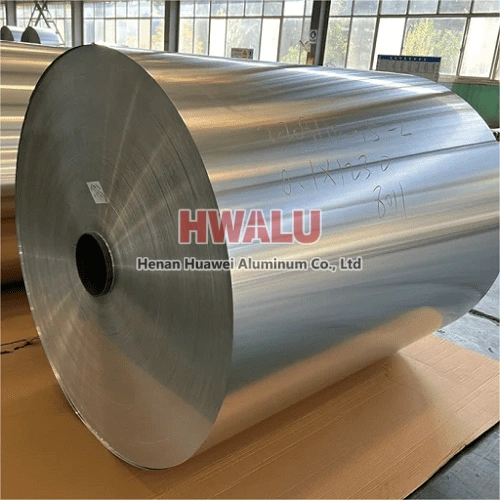What is aluminium foil 11 micron? 11 micron aluminum foil refers to a thin sheet of aluminum that is approximately 11 microns (μm) thick. The term "micron" is a unit of length equal to one millionth of a meter. Aluminum foil 11 micron, also known as 0.0011mm aluminum foil, is a multifunctional material with excellent barrier properties, flexibility and conductivity. Aluminum foil thickness application Aluminu ...
Why does hair use aluminum foil? The use of aluminum foil for hair is often done during hair coloring, especially when a specific pattern or effect is desired. Aluminum foil can help isolate and hold the hair dye in place, ensuring it only goes where it's needed, creating a more precise and detailed finish. When coloring hair, hairdressers usually divide the hair to be colored into sections and wrap each sect ...
What Is Food Packaging Aluminium Foil Roll 8011 As we all know, aluminum foil is widely used in our daily life, especially in the field of food packaging. Aluminum foil roll 8011 is a common food packaging material. 8011 aluminum alloy is a high-quality aluminum alloy with good ductility, strength and corrosion resistance. This type of aluminum foil is commonly used for food packaging. 8011 aluminum fo ...
what is 1145 alloy aluminum foil? 1145 alloy aluminum foil and its sister alloy 1235 have a minimum aluminum content of 99.45%, and the chemical and physical properties are almost the same. Occasionally, some production batches can be double-certified for 1145 and 1235 alloys. Like 1100 aluminum alloys, both are considered commercially pure alloys with excellent formability. Due to the high aluminum content, ...
Air conditioner aluminum foil Air-conditioning is indispensable to escape the heat in summer. As air-conditioning enters thousands of households, it is also constantly developing. At present, air conditioners are gradually developing in the direction of miniaturization, high efficiency, and long life. The air-conditioning heat exchange fins are also correspondingly developed in the direction of ultra-thin and hi ...
Aluminum foil is a good heat insulator because it is a poor conductor of heat. Heat can only be transferred through a material by conduction, convection, or radiation. In the case of aluminum foil, heat transfer occurs primarily through radiation, which is the emission of electromagnetic waves from the surface of an object. Aluminum foil is a shiny, reflective material that reflects radiant heat back towards i ...
Six Factors Restricting the Heat Sealing Strength of Pharmaceutical Aluminum Foil Packaging Products
For aluminum foil pharmaceutical packaging, the quality of the product is largely reflected in the heat seal strength of the product. Therefore, several factors that affect the heat-sealing strength of aluminum foil bags for medicines have become the key to improving the quality of product packaging. 1. Raw and auxiliary materials The original aluminum foil is the carrier of the adhesive layer, and its qual ...
Common aluminum foil materials are 8011 aluminum foil and 1235 aluminum foil. The alloys are different. What's the difference? Aluminum foil 1235 aluminum foil is different from 8011 aluminum foil alloy. The process difference lies in the annealing temperature. The annealing temperature of 1235 aluminum foil is lower than that of 8011 aluminum foil, but the annealing time is basically the same. 8011 aluminum foi ...
8011 aluminum foil is a common aluminum alloy material, which has received extensive attention and application due to its good performance and wide application fields. Below, we will introduce the characteristics and advantages of 8011 aluminum foil from various aspects. First of all, 8011 aluminum foil has excellent corrosion resistance. Aluminum foil itself has good oxidation resistance, and 8011 aluminum fo ...
The development of new energy vehicles is an important part of the low-carbon economy, and plays an important role in alleviating the contradiction between energy supply and demand, improving the environment, and promoting sustainable economic development. New energy vehicles are one of the industries that best reflect a country's technological development level, independent innovation capabilities and internatio ...
The thickness of aluminum foil for food packaging is generally between 0.015-0.03 mm. The exact thickness of aluminum foil you choose depends on the type of food being packaged and the desired shelf life. For food that needs to be stored for a long time, it is recommended to choose thicker aluminum foil, such as 0.02-0.03 mm, to provide better protection against oxygen, water, moisture and ultraviolet rays, th ...







